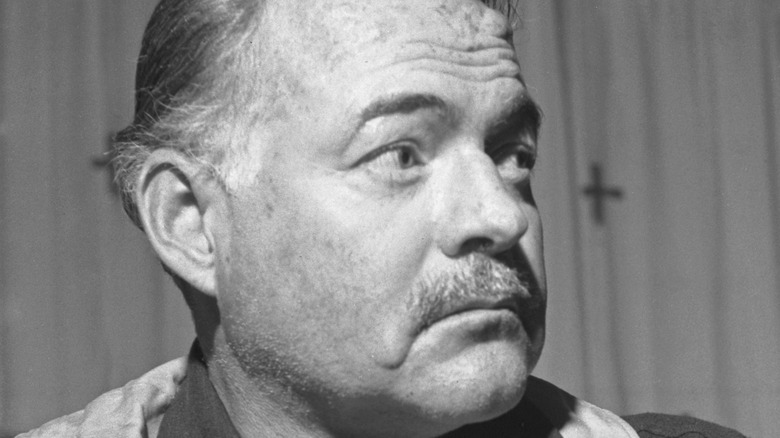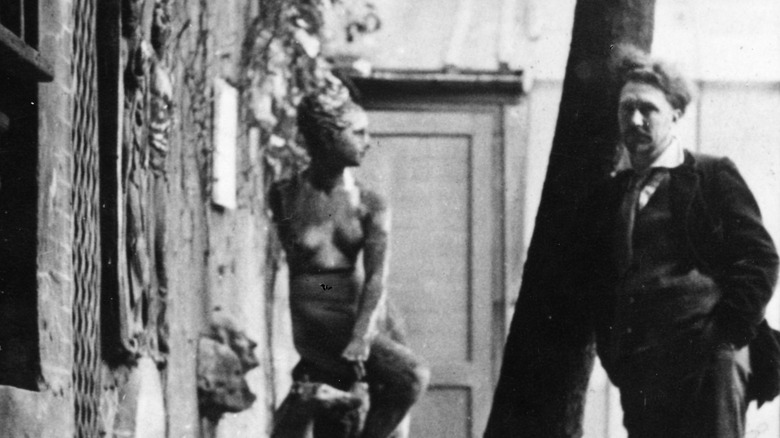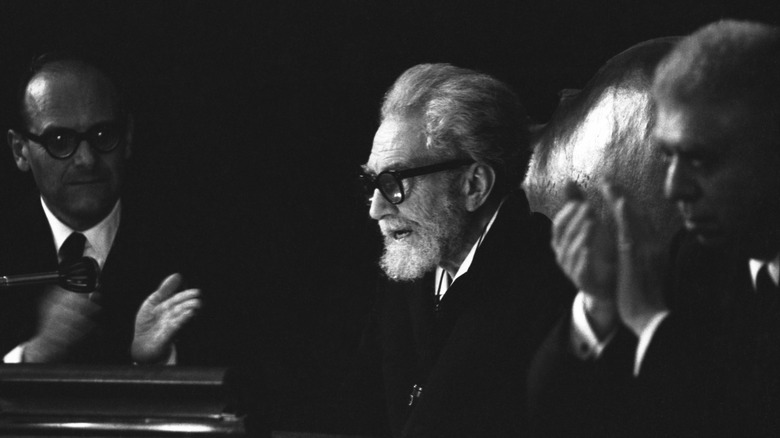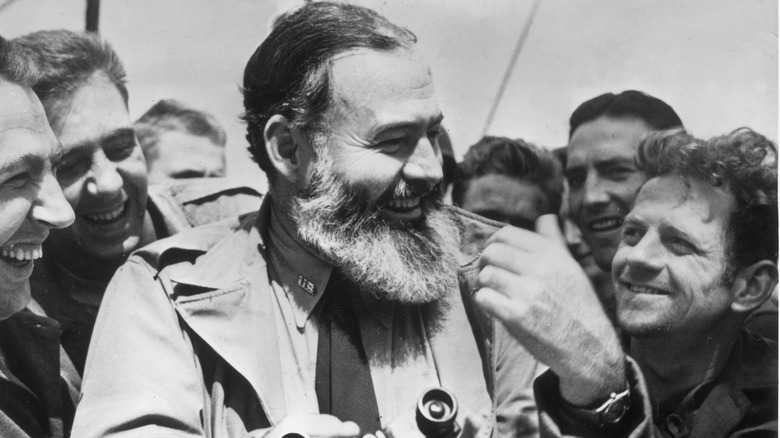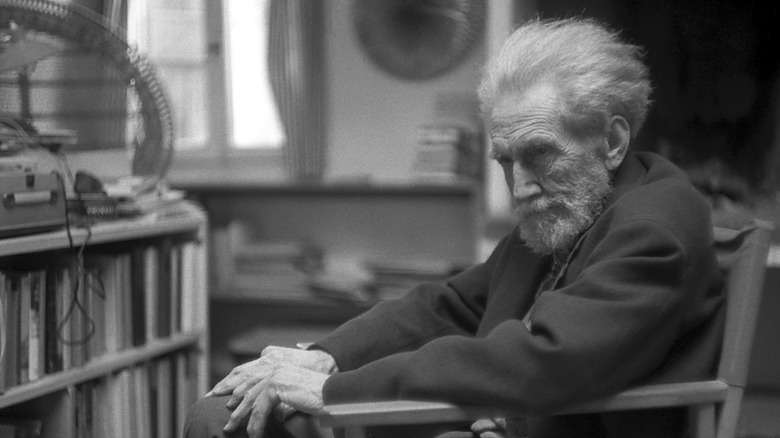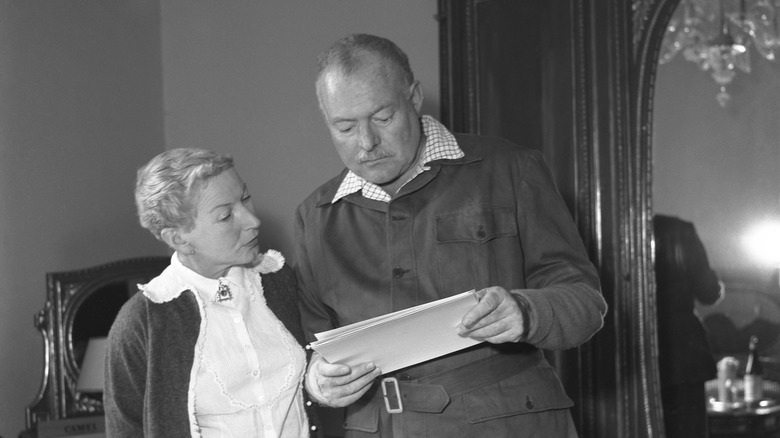The Complicated Relationship Of Ezra Pound And Ernest Hemingway
Authors can be reclusive, as if they sometimes prefer to visit the fictional worlds they create rather than engage with our fraught reality. Ernest Hemingway was notoriously bad at making friends he could connect with, his wife once said in a story in the Financial Review. Never a man of many words, he even famously said, "There is no friend as loyal as a book."
But the truth is, Hemingway had many friendships, especially in the literary world. Anyone who has seen Woody Allen's 2011 movie "Midnight in Paris" knows that Hemingway was friends with F. Scott Fitzgerald, even though the two had quite different personalities, and later turned more into "frenemies” after Hemingway was a little too critical of Fitzgerald's work, per Culture Trip. But one of Hemingway's friendships that is less often written about was with the modernist poet Ezra Pound, in whom Hemingway found someone similarly critical and brash.
Meeting in Paris
In 1922, Ernest Hemingway was familiar with Ezra Pound's work, especially his three "Cantos" and "Hugh Selwyn Mauberley" poems, in which Pound puts publishers on the spot for rewarding high reviews and catchy headlines in lieu of fine work (via Simply Charly). Nothing would have won Hemingway's admiration like a scathing critique of the industry.
Dressed in an "open Byronic collar and fin de siècle-style clothes," Hemingway was at first skeptical of Pound, but he quickly won over Hemingway and the two became friends, according to the book by John Cohassey, "Hemingway and Pound: A Most Unlikely Friendship."
Later, Hemingway visited Pound to box in his apartment, joking that in exchange for the boxing lessons, Pound helped him improve his writing style, according to the World History Project. Pound, one of the fathers of modernism in poetry, actually did welcome Hemingway into his literary circle and promoted his work among W.B. Yeats, Robert Frost, James Joyce, and T.S. Eliot, per the World History Project.
A literary exchange
Although the two both left Paris in the 1920s, Ernest Hemingway to Florida and Ezra Pound to Italy, they remained colleagues and friends, according to Simply Charly. Pound edited many of Hemingway's shorter pieces, encouraging Hemingway to stress his succinct style and ensure he "use absolutely no word that did not contribute to the presentation," according to Cohassey.
However, Hemingway claimed that Pound only directly saw a handful of his works for editing, according to The Paris Review. Pound's influence on Hemingway was mostly about connecting him in his literary network and being a trusted voice from within the industry to promote Hemingway's work, per The Paris Review. Pound seemed to have helped greatly on that front. Within a few years of meeting, Hemingway had six poems published in a publication Pound worked with. Hemingway even wrote a poem called "Homage to Ezra" in 1925, according to The Paris Review.
War breaks out
While Ezra Pound was in Italy, he began broadcasting anti-Jewish messages in support of Benito Mussolini in the 1940s on a Rome-based radio station that was transmitted to the U.S., according to The Guardian (the poem "Canto XLV" that Ernest Hemingway liked was itself riddled with anti-semitic language and imagery as well). Pound's love for Mussolini traces back to a concert he attended at the leader's home in 1927, according to The New Yorker. Eventually, Pound made over 100 of these fascist broadcasts during World War II, according to Open Culture. Afterwards, he wrote two Italian "Cantos" to be used as propaganda.
Meanwhile, Hemingway was more directly involved in the war, serving as a correspondent in Europe between 1944 and 1945, according to the International Academic Forum Journal of Arts & Humanities. He also informally (and illegally) helped the U.S. government in the war, ultimately winning a Bronze Star military award, although he denied informing the government of anything as it was deemed illegal by the Geneva Convention (via IAFOR Journal of Arts & Humanities).
A facist gets by
Ezra Pound was charged with treason by the U.S. government in 1945, although he was never tried, according to The New Yorker. Ernest Hemingway, who was an active anti-facist after his time spent participating in wars, played no insignificant part in helping Pound escape trial. One of many elite friends to write in and recommend he needed psychiatric care for his fascism, Hemingway's words sent Pound to a psychiatric facility, where he stayed for 12 years (per The New Yorker, Open Culture).
Writing to Archibald MacLeish, Hemingway penned that Pound was "obviously crazy," and deserved "punishment and disgrace," but more than anything "ridicule," according to Open Culture. He denounced Pound's fascist language as utterly "vile...absolutely idiotic drivel," per Open Culture. He asked Pound not to be hanged, but rather treated for his mental ailments, and this tactic worked.
According to The New Yorker, Pound — who was never even given an official diagnosis — made friends at the psychiatric facility, including John Kasper, a segregationist with neo-Nazi associations. To rub salt in the wound, when Pound's case was dismissed in 1958 and he returned to Italy, he gave the fascist salute as if the past decade had never happened, per The New Yorker.
After the release
Ernest Hemingway's health began to decline as he grew older, culminating in his death in 1961. According to PBS, Hemingway had "severe depression, paranoid delusions and bipolar disease exacerbated by a history of alcoholism, severe head injuries and a genetic disorder of iron metabolism known as hemochromatosis."
Although mental health was not spoken about at the time like it is today, Hemingway was thought to have died by suicide, per PBS. Ezra Pound, who was 14 years the senior of Hemingway, died in Venice in 1972. According to The New York Times, Pound had fallen silent in the last few years of his death.
The two authors had many similarities, including their no-nonsense writing and attitudes. Both men were even on the Federal Bureau of Investigation's watchlist at one point, Pound for his fascism and Hemingway for trying to locate German U-boats in Cuba in the 1940s, according to Simply Charly. Hemingway was seemingly grateful for the leadership and advice Pound had provided him, somehow managing to overlook the fascism he detested.
